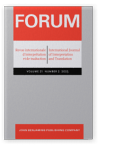Vol. 21:2 (2023) ► pp.258–278
Extent and patterns
A diary-based investigation of out-of-class language learning in Chinese interpreter education programs
While students’ development of language skills is crucial to their development of interpreting competence, existing literature in interpreter training provides little information on the extent and patterns of student interpreters’ language learning behaviours. This study examined 17 Chinese student interpreters’ language learning behaviours through 741 out-of-class learning diary entries. This study quantified data on the frequency, duration, and breakdown of learning activities and compared the data across different program stages and university levels, revealing that (1) language learning was nearly as important as interpreting learning, (2) students’ efforts on language learning were in line with interpreting courses, and (3) while the majority of language learning sessions were comprehension-based and single-modal, students who progressed further in their education and with more elite educational backgrounds spared a bigger proportion for production-based language learning and multi-modal language learning. The article proposes incorporating corresponding language enhancement modules into interpreter education programs to boost training outcomes.
Article outline
- 1.Introduction
- 2.The relationship between language skills and interpreting competence
- 3.Methods
- 3.1Diary method as a proxy of observation in exploring students’ learning behaviours
- 3.2Background
- 3.3Research instrument
- 3.4Data collection
- 3.5Data analysis
- 4.Results
- 4.1Language learning in out-of-class learning
- 4.2Language learning activities
- 4.3Language learning patterns related to stage in the program
- 4.4Language learning patterns related to university level
- 5.Conclusion and discussion
-
References
